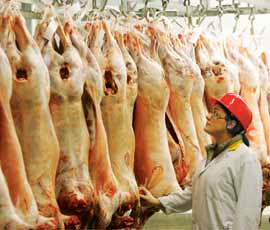Challenges of a weaker euro for UK agriculture

A weaker and more volatile euro poses a range of challenges to UK agriculture and to its food and drink industry customers.
The outlook for the currency is volatile, with most expecting the pound to strengthen further against the euro over the next few months.
As Farmers Weekly went to press on Wednesday, a poor German growth figure of 0.25% for the final quarter of 2011 had wobbled the markets again and the euro dipped to a 12-month low of £1=€1.2105. On 9 January it had reached a 16-month low of £1=€1.2136. The areas most vulnerable to import competition are red meat, pork and dairy produce, with Irish beef exporters expected to make the most of this opportunity to step up competition in the UK market.
On the export front, grain and oilseed traders, along with lamb and beef exporters, are having to battle harder for business.
Exporters face not only a currency disadvantage but also the prospect of depressed demand in eurozone customer counties that are struggling for economic growth.
However, inputs such as machinery and some feed ingredients priced in euros may become more competitive.
Tom Barclay of currency broker WorldFirst has seen a big increase recently in hedging activity by machinery businesses looking to reduce their currency risk. This is to protect themselves from currency movements as they bring in more kit in the run-up to April when the Annual Investment Allowance on plant and machinery falls to £25,000.
Farmers were split in their opinion on what to do about hedging SFP, said Mr Barclay. “In one camp you have farmers who are rightfully cautious, uncertain about what is going to happen to the euro and whether it will collapse or partially collapse, so they aren’t doing anything at all.
“On the other side, the more sophisticated farmer is just getting on with it and hedging their SFP if they are of the view that £/euro will strengthen. If they are not of that view, they are holding tight.”
Nevertheless, about 20% fewer farmers had hedged so far this year compared with last, he said.
Whether to hedge the SFP risk or not depended on several factors, including the size of the SFP in relation to the overall income of the business, said Nick Tapp of Bidwells.
“There’s no one answer to the question of SFP hedging. Farmers need to be having a discussion with their bank or broker about it and in particular about how the failure of the euro would be managed.”
HSBC’s Allan Wilkinson said that whatever the prospects for the euro, farmers would still be paid their SFP, but that they must assess risk and reduce the risk in their businesses wherever possible.
“Our advice would be to hedge,” said Mr Wilkinson. However, he questioned whether the 87p that the bank was forecasting for 30 September euro value was achievable. “It could be down to 85p or even lower, reflecting the stronger pound.”
Other risks that must be targeted included poor cost control and poor forecasting skills. “Those that have good control tend to lose least and make the most as the market changes,” he said.
NFU chief economist Phil Bicknell said that farmers needed to be aware of what was happening in the wider economy and of the effect on farmgate prices. “There’s no doubt that when you look at the profitability of farming as measured by [DEFRA’s] Total Income From Farming figure, it is affected by exchange rates.”
